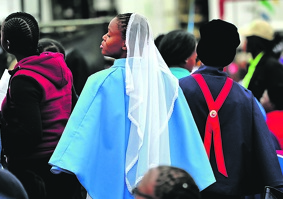
Suppose a well-known paedophile wants to establish a church where children are likely to attend – are we as society expected to fold our arms and turn the other way?
If the answer is no, then Prophet Samuel Radebe’s assertions, and those who share his views on no regulation of the religious sector, cannot be left unchallenged.
A powerful dome such as the church cannot be left unattended in a flourishing country where the gap between the haves and the have-nots is ever-expanding, with “pastors” who live in a “material” world.
If the answer is yes, then as a country we are doomed.
In April 2013, a certain bishop from Limpopo delivered a sermon in Gauteng in which he alluded to being deputy to Jesus Christ.
The members of his church ululated and clapped hands and one wonders how many of them suspected their “holy” man was hallucinating, because it takes a true dimwit to hallucinate that Jesus Christ, the Son of Man, was born in the south of Africa.
One wonders how many members of the church who clapped know the basics of the Bible.
People might disagree on many religious grounds, but surely even atheists can agree and attest that the bishop’s assertion about being deputy to Jesus Christ is false.
Maybe Steve Biko was right when he said that “the greatest weapon in the hands of the oppressor, is the mind of the oppressed”.
It is because of such wanton behaviour by some in the clergy that some of us as South Africans are supportive of the initiative of the CRL rights commission to regulate the religious sector and subject it to peer review mechanisms that will be managed by the clergy.
The citation of the South African Bill of Rights by Radebe serves as a smokescreen.
His arguments are akin to a motorist lamenting the presence of traffic police on South African roads because holders of driver’s licences are familiar with the rules of the road.
His arguments cannot be valid simply because the rules are being transgressed with impunity by “qualified drivers”, as can be seen by the horrific number of accidents and fatalities on our roads.
Maybe, in support of his call to desist from regulating the religious sector, we should remove traffic officers from the roads and see what will happen.
In views expressed by the prophet, one wonders why some South Africans prefer to refer to the US as some sort of a benchmark when advancing certain issues.
Why not Tanzania or Uganda?
In South Africa, some members of the clergy prey on the illiterate, downtrodden, sickly and other vulnerable members of the society.
Some of these charlatan pastors, prophets, bishops and reverends are so brazen in their thievery that they even demand 10% from SA Social Security Agency beneficiaries.
It doesn’t happen in the US, because in some states, poor people are given food stamps as opposed to money, and one has to prove one bought food with the allowance.
In terms of economics, most members of the clergy could be described as the consumer class. They just consume; they produce nothing of economic value, except when building, fitting churches and keeping the German economy running.
Those who play a minor economic role are those whose churches produce uniforms, bottles, oils and other consumables, but who is producing those items? Black-owned companies or white-owned companies?
What is demoralising about some of these African churches is that, in terms of the membership, 99% are black people, but the leaders do business with 99% white companies.
So in essence, these churches are spiritually black, but economically white.
If the CRL commission succeeds in regulating the religious sector, it would put paid to the spectacle of ordinary men and women calling themselves Deputy Jesus Christ in a quest to conquer and capture wallets.
The hurdle to regulation of the sector might prove to be the Parliament of the Republic of South Africa.
Apart from hobnobbing with the so-called men of God around Easter, from the president of the republic to the backbencher, MPs, with the exception of a few, will be seen in big and small churches smiling with “holy men”.
Bar a miracle, to expect MPs to regulate the religious sector is akin to expecting an alcoholic to refuse keys to a fully stocked lounge bar.
Some of these black MPs are willing recipients of prophecies that foretold that they would go to Cape Town and waive their background poverty goodbye.
Even though South Africa is one country of diverse people, the difference between “black theology” and “white theology” is palpable.
It would seem that the mushrooming of African-dominated churches is fulfilling the need to experience miracles and become a member of the bourgeoisie.
The same is not happening across the skin divide.
Legodi is a Christian
TALK TO US: Do you think that religion and churches should be registered and more highly regulated?
SMS us on 35697 using the keyword CHURCH and tell us what you think. Please include your name and province. SMSes cost R1.50




 Publications
Publications
 Partners
Partners








